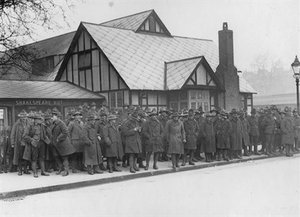Shakespeare in 1916
Shakespeare in 1916: the First World War and the Origins of Global Shakespeare
A talk by Gordon McMullan, Professor of English and Director
of the London Shakespeare Centre at King’s College London,
Strand Campus
Friday 12 February 2016
Review by Pamela Jacobsen, Clinical Psychologist and NIHR Doctoral Fellow at IoPPN, KCL

Commemoration is as much about forgetting as it is about remembering. This was the central thesis of Gordon McMullan’s February 12th thought-provoking lecture on how the Shakespeare Tercentenary was commemorated in 1916. This was a particularly apt subject for Professor McMullan’s talk, given his role as Academic Director of Shakespeare400. He chose to focus primarily on the role of one of his predecessors in the KCL English Department, Sir Israel Gollancz, in planning the Tercentenary 100 years ago. This respectful acknowledgement of the importance of Gollancz’s legacy may foreshadow how McMullan himself will be remembered by his academic descendants a century from now.
The talk began with an intriguing example of how the past is both simultaneously preserved and distorted by acts of commemoration. The first slide McMullan showed in his talk was a plaque dedicated to Gollancz which records his birth year as 1864. This surely must have been fate; that a man born in the tercentenary of Shakespeare’s birth would go on to lead commemorations for the tercentenary of his death. The only problem with this seemingly delightful connection is of course that Gollancz was actually born the year before the tercentenary of Shakespeare’s birth, in 1863. How exactly this rather glaring error was made, and whether consciously or unconsciously, we can never quite know for sure. McMullan argued that it may have arisen from our tendency to reconstruct the past to fit a certain narrative. Perhaps it is human nature to reconstruct the narrative of a person’s life through the lens of their eventual destiny.
McMullan led us through the intriguing tale of the plans for the Shakespeare Tercentenary in 1916, and how these were largely de-railed by the global turbulence caused by the outbreak of the First World War. For example, plans for a commemorative theatre did not go according to plan. A site in central London had already been found and cleared ready for construction to begin, when the project had to be halted due to difficulties in fund-raising. The site was then turned into the Shakespeare Hut, which was leased by the YMCA during the war and used to accommodate ANZAC soldiers. What was intended to serve as a permanent memorial ironically ended up serving as a temporary shelter. In McMullan’s words, the Shakespeare Hut was “designed to be forgotten”. McMullan was eager to point out however, that performances of Shakespeare’s plays did in fact take place in the concert hall of the Shakespeare Hut, which doubled as a dormitory for the troops. Gollancz did also manage to bring to fruition other parts of the Tercentenary commemorations, perhaps most notably collating and editing an eclectic range of international contributions to A Book of Homage to Shakespeare, which is set to be reissued later this year.
In 1916, the anniversary of Shakespeare’s death was commemorated in the midst of the Great War. A hundred years on in 2016, Shakespeare400 coincides with centenary commemorations for WW1. Themes of life and death; violence and kindness; and despair and redemption resonate through the WW1 centenary as they do through Shakespeare’s works. In another 100 years’ time, no doubt the commemorations of both will continue to reflect this perpetual remembering and forgetting.

